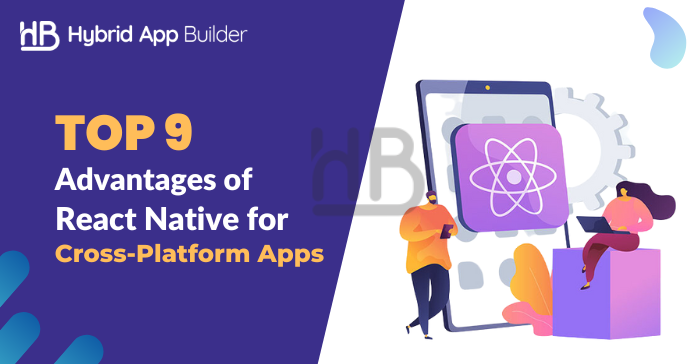
Are you tired of developing separate codebases for iOS and Android apps? Are you looking for a more efficient solution to build cross-platform mobile apps? Look no further than React Native app development!
React Native is a well-liked open-source framework enabling developers to create top-notch mobile applications for iOS and Android platforms utilizing a unified codebase. It blends the strengths of React, a JavaScript library that constructs user interfaces, with the adaptability of native mobile app development.
“React Native is like a secret weapon for developers who want to build cross-platform mobile apps with ease.”
A Quick Introduction Of React Native Development
Facebook developed React Native as an open-source framework for creating mobile apps. With this framework, developers can create mobile apps for iOS and Android platforms using a single codebase, enabling high-quality app development. React Native is based on the popular React library, known for building web applications.
React Native leverages the power of native mobile app development and combines it with the flexibility of JavaScript, which makes it a go-to choice for cross-platform app development. With React Native, developers can create visually appealing and responsive mobile apps that deliver native-like performance and functionality.
Top 9+ Benefits Of Using React Native For Cross-Platform Mobile Apps
#1 Code Reusability
Before 2015, a developer must build two separate sets of codes for two widely accepted platforms- iOS and Android. There comes React Native that changes the whole scenario. Just write and use a single codebase across different platforms, called code reusability. It reduces development time and costs.
#2 Simplified development process
The simple is better holds with app development. Because of the pre-built components in React Native, an app development company can deliver apps quickly. Another developer has likely created a similar code you can use in your deployment. Use those codes free of cost.
React Native’s component-based architecture makes building and maintaining code easily, simplifying the entire development process.
#3 Use Of Third-Party Plugins
Strangely but true, most other frameworks could be more flexible and generous towards third-party plugins. With React Native, you can add plugins bringing flexibility to change interfaces, themes, and templates.
#4 Large Community Support
Whether you hire React Native developer with how much experience and skills, there comes a time when you are stuck and need help. React Native has a vast community of developers, so resources, tutorials, and documentation are available for FREE.
#5 Cost-Effective
Not everyone can afford to pay a license fee to use the platform. There are multiple costs associated with app development, so it’s better to at least save by not paying for the framework. First, its availability as open-source is the biggest perk. The icing on the cake, code reusability, hot reloading, easy debugging, etc, further helps in resource reduction.
#6 Hot Reloading
React Native cross platform allows the team to see the changes in real-time. This process is called hot or live reloading, which means a developer can quickly and easily update and change the app.
#7 Easy To Learn
React Native is based on React- a widely accepted JavaScript library. So it is easy to learn and use for building mobile apps. Moreover, organizations can build cross-platform apps with just one team of developers for multiple platforms.
This approach minimizes the risk of chaos and streamlines communication, resulting in a more efficient development process. Organizations create cross-platform applications compatible with various operating systems with this unified approach.
#8 Native Performance
One of the biggest hurdles for cross-platform development tools is ensuring businesses provide native performances to the end users. We can’t deny that each platform has its layout, speed, usability, update guidelines, support system, and loyal user base.
React Native development means an app that can perform like a native, delivering an excellent user experience.
#9 Faster Time To Market
React Native’s code reusability and simplified development process is directly proportional to the app development time. React Native can get your apps to market faster. In addition to that, React Native is great for building a wide range of apps, from simple apps to complex ones, making it an excellent choice.
#10 Uncomplicated Testing
Among other benefits of React Native, providing ways to write test codes in small modules is a prime one. That seems a small gesture from React Native but saves hours that go into an endless testing loop with other frameworks. Before writing the entire program, a developer can test for clean and error-free codes.
In A Nutshell
If all the points mentioned above are insufficient for you to choose this framework, let’s share some big names using it. Companies like Bloomberg, Facebook, Instagram, Skype, Pinterest, Salesforce, Discord, and Walmart use this framework somehow.
It is rightly called the “cross-platform framework of the future” for its evolving features and getting better and better. Use React Native development and reap benefits such as time-saving, cost reduction, and improved app performance. Use it to build high-quality apps working on multiple platforms efficiently. And don’t forget to help us understand your experience through the comment section later. Choose the best react native development company in USA for your next project.
HybridAppBuilders
Latest posts by HybridAppBuilders (see all)
- The Best Flutter App Development Trends in 2025 - April 10, 2025
- A Comparative Study of Cross-platform Mobile Application Development - April 4, 2025
- Flutter 4.0: The Next Chapter in Cross-Platform Development - March 27, 2025
